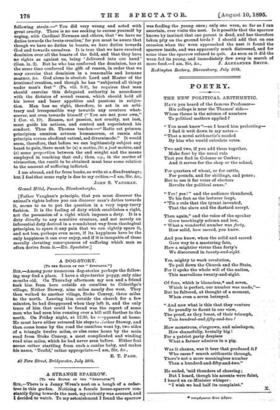POETRY.
THE NEW POLITICAL ARITHMETIC.
HAVE you heard of the famous Professor— His college is near the Thames' side— Whose theme is the science of numbers To political matters applied?
"You must know "—so I heard him prelecting- I find it writ down in my notes- " That a novel arithmetic's needed By him who would calculate votes.
Two and two, if you add them together, Make four by the usual rule That you find in Colenso or Cocker ; And it serves for the shop or the school, For quarters of wheat, or for cattle, For pounds, and for shillings, and pence;
But to use it for votes of electors Revolts the political sense."
"Yes! yes !" and the audience thundered,
To his feet as the lecturer leapt, "Tis a rule that the tyrant invented,
That the slave and the dastard accept.
Then again," and the voice of the speaker Grew touchingly solemn and low, "What a wonderful number was forty,
How solid, how sacred, you know.
And you know, when the solid and sacred
Gave way to a mastering fate, How a mightier virtue than forty's We discovered in twenty-and-eight.
Yes, mighty to work revolution, To pull down the Church and the State, For it spoke the whole will of the nation, This marvellous twenty-and-eight.
Of four, which is blameless,* and seven, Which is perfect, our number was made,"— Bat he faltered, at thought of a moment,
When even a seven betrayed.
"And now what is this that they venture
So proudly to flaunt in our view, The proof, as they boast, of their triumph,
Tnis hundred-and-fifty-and-two?
How monstrous, o'ergrown, and misshapen,
How shamefully, brutally big ! For a patriot party despises What a farmer admires in a pig.
Was it chance, was it beer that produced it
Who cares search arithmetic through, There's not a more meaningless number Than a hundred-and-fifty-and-two."
He ended, 'mid thunders of cheering; But I heard, though his accents were faint, I heard an ex-Minister whisper : "I wish we had half its complaint." X.
• Tel-pc:I-repos veu 4,&you.


































 Previous page
Previous page